(HIpE) 2009 Program and Abstracts - Health Sciences - Curtin ...
(HIpE) 2009 Program and Abstracts - Health Sciences - Curtin ...
(HIpE) 2009 Program and Abstracts - Health Sciences - Curtin ...
You also want an ePaper? Increase the reach of your titles
YUMPU automatically turns print PDFs into web optimized ePapers that Google loves.
<strong>Abstracts</strong>Faculty development of interprofessional education: Advancing health care professionalpreparation.Interprofessional Education Excellence in Teaching Team - <strong>Curtin</strong> University of TechnologyMaria Chilvers School of Nursing & Midwifery, Peter Gardner School of Physiotherapy,Professor Jeff Hughes School of Pharmacy, Beatrice Tucker Office of Teaching <strong>and</strong> LearningMr Alan Tulloch School of Nursing & Midwifery<strong>Curtin</strong> University of TechnologyM.Chilvers@curtin.edu.au, P.Gardner@curtin.edu.au, J.D.Hughes@curtin.edu.au, B.Tucker@curtin.edu.au,A.Tulloch@curtin.edu.au<strong>Health</strong> professionals need to underst<strong>and</strong> the roles <strong>and</strong> responsibilities of each other <strong>and</strong> how to collaborate todeliver the best outcomes for patients. To advance health science students’ knowledge, skills <strong>and</strong> attitude tocollaborative practice a number of interprofessional education workshops have been conducted over the pasttwo years at <strong>Curtin</strong>. These were initiated by staff from Pharmacy <strong>and</strong> then developed in conjunction withNursing, Physiotherapy, Occupational Therapy, Social Work, Psychology, Speech Pathology <strong>and</strong> Dietetics.Students who were 3 rd year or final year have been invited to participate as it was thought that they havecovered an appropriate level of theoretical content in their course prior to the workshops. Medical students fromthe University of Notre Dame <strong>and</strong> the University of WA were also invited to participate.To date small groups of students have been given the opportunity to participate with a view to keeping the sizeof groups manageable to maximise discussion. The workshops thus far have covered the topics of medicationsafety, multidisciplinary care <strong>and</strong> communication, <strong>and</strong> patient-centered care of stroke. The workshops havebeen complex case study based <strong>and</strong> have involved a mixture of small group interdisciplinary discussion <strong>and</strong>problem solving as well as presentations by invited experts in complex case study management. Feedback fromparticipants has been positive with many reporting the perceived value of entering clinical placements with anincreased knowledge of the role of other professions in case management. The outcomes of these workshopsalong with plans for the future will be presented.Student administered stuttering treatment in combination with mindfulness based cognitivetherapy for adults who stutter.Janet Beilby, School of Psychology, Dr Michelle Byrnes, School of Psychology,Stephanie Borrello, 4 th year Speech Pathology Student & Kate Young, 4 th year Speech Pathology Student<strong>Curtin</strong> University of Technologyj.beilby@curtin.edu.au, m.byrnes@curtin.edu.au, stephanie.borrello@student.curtin.edu.au,kate.young@student.curtin.edu.auThe presentation describes an 8 week Interprofessional treatment programme for 10 adults who have lived withthe disability of a life-long clinically diagnosed stutter. Stuttering affects one in every 100 people worldwide <strong>and</strong>the consensus is that stuttering h<strong>and</strong>icaps not only the fundamental right a person has to speak freely, but alsotheir ability to cope positively in society at large. The person who stutters often incurs bullying <strong>and</strong> ostracismduring their school years <strong>and</strong> they are h<strong>and</strong>icapped educationally with 70% of adults who stutter having difficultygaining meaningful employment.Four final year speech pathology students ran the programme with supervision from <strong>and</strong> collaborative clinicalpractice with specialists from neuroscience, psychology <strong>and</strong> speech pathology. The students <strong>and</strong> their clientsattended each Wednesday evening for 8 concurrent sessions in the <strong>Curtin</strong> University Stuttering TreatmentClinic.Mindfulness Based Cognitive Therapy was delivered with contemporary Stuttering Treatments tailored for eachadult stuttering client. This unique multidisciplinary holistic approach addressed the fluency needs of the clientsat the same time as their communication fears, anxieties <strong>and</strong> social interaction difficulties were being managed.At the end of the 8 weeks, all clients showed significant gains in speech fluency but equally satisfying were thepositive quality of life changes the clients demonstrated in their daily social <strong>and</strong> emotional connections withsociety.<strong>Health</strong> Interprofessional Education (<strong>HIpE</strong> <strong>2009</strong>) — Student Conference 14


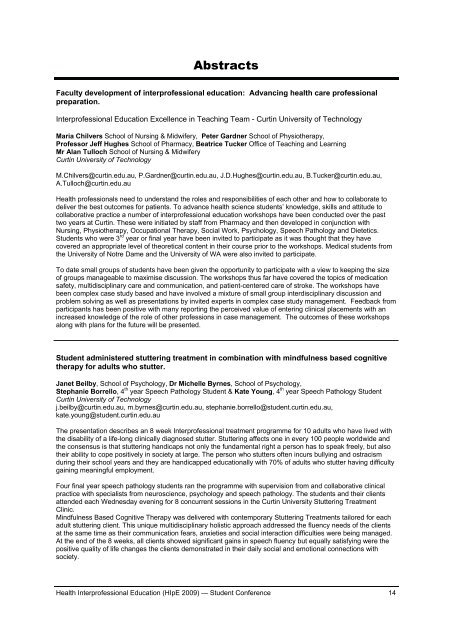
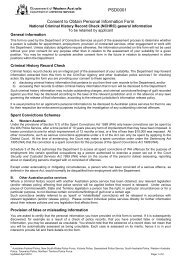
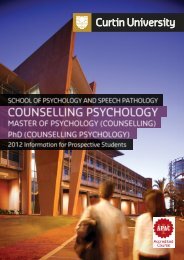
![Mental health commission report July 2010 - June 2011 [.pdf]](https://img.yumpu.com/50755705/1/184x260/mental-health-commission-report-july-2010-june-2011-pdf.jpg?quality=85)
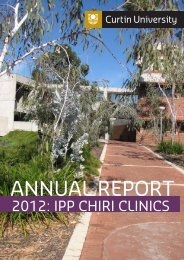
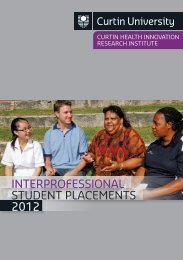
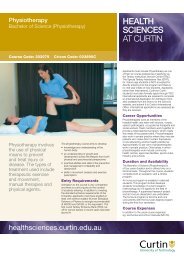
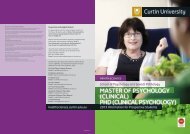
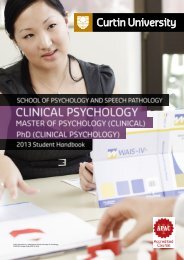

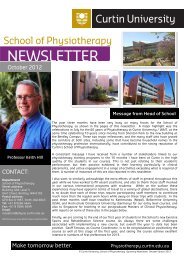
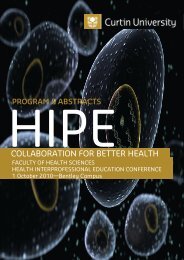
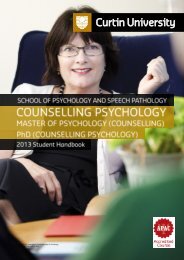
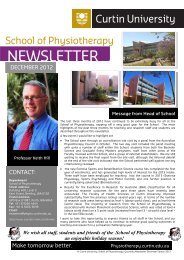
![2007 Annual Report [.pdf] - Health Sciences - Curtin University](https://img.yumpu.com/44476724/1/184x260/2007-annual-report-pdf-health-sciences-curtin-university.jpg?quality=85)